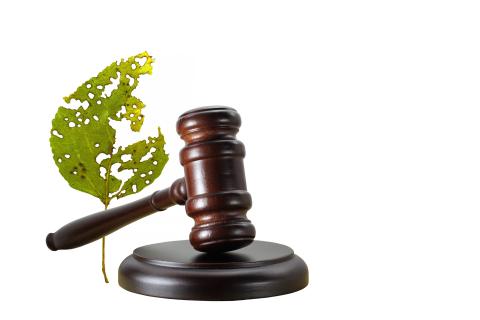European Economic
and Social Committee
EU and the environment: time to tighten criminal law
Following the publication of the evaluations on the shortcomings of the Environmental Criminal Directive – ECD, the Commission decided to replace it with a new EU Directive aimed at making the protection of the environment through criminal law more precise, legally secure and effective. In the opinion "Improving environmental protection through criminal law", adopted at the March plenary session, the European Economic and Social Committee (EESC) made concrete proposals to improve the legislation, in order to make it truly effective, proportionate and dissuasive.
The main binding instrument currently in place in the EU to tackle environmental crime is the Environmental Criminal Directive – ECD (Directive 2008/99/EC, of 19 November 2008).
An evaluation conducted by the Commission in 2019 and 2020 showed that the ECD did not have much effect on the ground. Over the past decade, the number of environmental crime cases successfully investigated and sentenced remained low. Moreover, the sanction levels imposed were insufficiently dissuasive and no systematic cross-border cooperation took place.
The proposal for the new Directive outlines and reviews the main deficiencies of the current Directive: the scope of the Directive, clarification of legal terms, sanctions, cross-border investigation and practical law-enforcement, statistical data collection and dissemination.
Scope update and clarification of legal terms
Since the scope of the current ECD is outdated, the EESC welcomes the extension of the list from nine environmental offences to eighteen. However, it believes that the list should be expanded to as many types of environmental offence as possible. This would avoid the need for further revision of the ECD shortly after its entry into force and prevent specific environmental criminal activities from going unpunished. The EESC also points out that the proposal lacks a definition of an autonomous general offence of harming or endangering the environment.
What's more, the EESC would have liked to see the offence of ecocide included in the operational part of the ECD, not just in its recitals. The European Parliament, in a January 2021 resolution, similarly encouraged the EU and the Member States to promote the recognition of ecocide as an international crime under the Rome Statute of the International Criminal Court (ICC).
Furthermore, the EESC regards as unsatisfactory the proposed elements to be taken into account in assessing whether the damage is substantial, believes there may be a need for further guidance and considers that a self-standing definition of "substantial damage" would be more explicit.
Higher sanctions
Let's make sanctions more costly than the benefits criminals can hope to be made by harming the environment and human beings
, emphasised Ozlem Yildirim, co-rapporteur for this opinion.
The EESC endorses the inclusion of minimum standards for setting maximum limits for penalties for private persons and maximum limits for sanctions for legal persons. However, for sanctions to be truly effective, proportionate and dissuasive, the EESC believes these limits should be substantially increased.
Sufficient resources and mechanisms for effective enforcement
In order to step up enforcement of environmental crimes, the EESC reiterates the recommendations set out in its Information Report on Evaluation on Environmental Crime Directive: the EU Member States should establish specialised police forces, prosecutors, judges and courts in the area of environmental crime. For the ECD to be genuinely effective, it should be accompanied by adequate resources and training at the level of Member States.
Also, in its Information Report on Environmental protection as a prerequisite for respect for fundamental rights, the EESC emphasised the urgent need for the EU to introduce a Sustainable Corporate Governance Directive and an EU anti-SLAPP (Strategic Lawsuits Against Public Participation) law to protect public watchdogs such as journalists, rights defenders, activists and whistle-blowers. The EESC therefore welcomes the inclusion of a provision for the protection of persons who report environmental offences or assist the investigation.
Internal and cross-border investigation through better statistical data collection and dissemination
In the light of the ongoing war in Ukraine, which is having a severe impact on people and nature, the EESC also stresses the international leadership role of the European Union in protecting the climate and the environment through increased cross-border cooperation with the EU's neighbouring countries. The proposed revision of our Environmental Crime Directive is good, and it can even get better. Let's use it to stand with Ukraine and act for justice and peace, and against war criminals harming human health and the environment
, added Arnaud Schwarz, rapporteur for this opinion.
The approximation of investigative tools, the obligation to cooperate through EU agencies (Europol, Eurojust and OLAF) and the setting up of national contact points will directly foster cross-border cooperation, complement and reinforce each other and lead to investigations that are more effective, as many environmental crime cases can only be conducted successfully on a cross-border basis. The Commission should also explore the possibility of extending the jurisdiction of the European Public Prosecutor's Office to environmental crimes, thereby creating a Green European Public Prosecutor's Office to support the fight against environmental crimes identified as being linked to organised crime.
